on wednesday, a few dozen anti-militarist protestors were greeted by 40 vans of riot police outside the BAE systems hq in victoria.
given this background, and with a 2011 high court injunction still in place at canary wharf estate prohibiting 'any persons unknown remaining on the estate in connection to protest action', backed by the private entity's own security force, there was some concern over whether friday's 'they owe us' protest would pass off peacefully, if at all.
on the day, despite a massive police and canary wharf security turn-out, the event went ahead without hindrance. this was later described by the organisers as an 'amazing day of resistance', but i can't help feeling that the fairly small numbers and the wholly non-confrontational nature of the protest had rather more to do with it being tolerated by the authorities.
in the week before the G8, the message of the protest was that debt has become the driving force of economics, used to divide people, enslave people, and widen the gap between rich and poor. using the straplines 'they owe us' and 'shift the debt', they highlight the enormous tax breaks given to fossil fuel extraction companies, the huge bail-outs given to the banks funding these projects, and the tax evasion by corporations, connecting climate change, austerity and cuts as the inevitable outcome.
taking this message to the heart of financial capitalism was a noble idea, but with only a couple of hundred people bothering to turn out, unfortunately it became more of a curiosity to the passing bankers than a real challenge.
with loads of riot vans parked nearby as back-up, the square itself was controlled by a couple of dozen canary wharf uniformed security, several dozen police, half a dozen police liaison officers, and an equal number of undercover security men and women (easily spottable close up by their very discreet pink earpieces which looked like earplugs).
while volunteers held up a huge 'capitalism = crisis' banner, along with another which read 'shift the debt', two bamboo tripods appeared, and climbers held up a 'they owe us' banner between them. a bicycle sound system was used throughout the afternoon to present speakers, musicians and poets, while a smaller amplifier was used in a workshop area.
among the many speakers and performers were david graeber, danny chivers and pete the temp, with presentations from 'no dash for gas', londond pensioners assoc, DPAC, and ukuncut, while workshops were also facilitated by some of those groups as well as haringey solidarity group, and fuel poverty action. all this took place between the tall towers of mammon, surrounded by expensive waterside wine bars, near to a motor show exhibiting the latest high-end vehicles from the likes of jaguar, and under a huge orwellian rolling news display that told us iran was funding terrorism and the london stock exchange was down a couple of points while house prices were at their highest.
by the time the 'occupy assembly' was called, people were drifitng away, and there were maybe a hundred people involved while others sat around in the sun and a few decided to have a very cold dip in the water.
at the end, the bike sound system headed south to the 'food liberation front' event at crossharbour, followed by a few dozen activists and of course a lot of police.
if this report sounds a bit negative, i just want to clarify i have nothing against the organisers - they worked hard to put together an interesting and informative afternoon. i also believe that all forms of protest are worthwhile, from letter-writing to direct action, and it is important to try and find grounds for engagement and solidarity rather than sniping at people whose approaches differ from others. i guess i'm just disappointed at the turn-out and i wonder what it's going to take for more ordinary people to realise we/they CAN change things and it's worth taking to the streets.

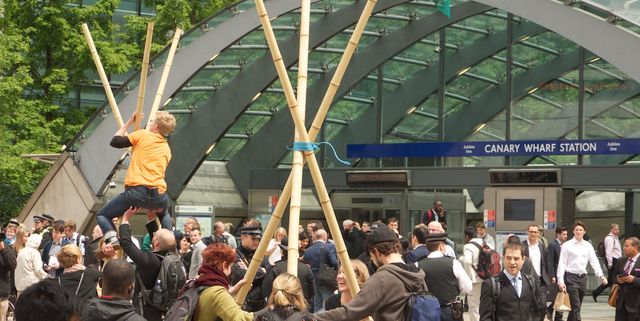
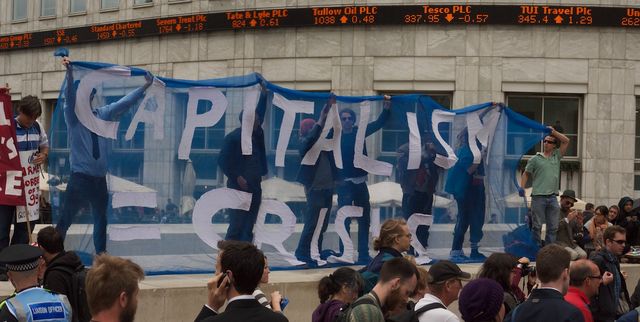
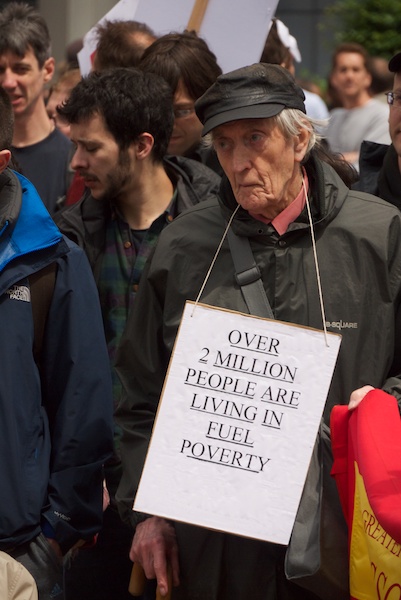
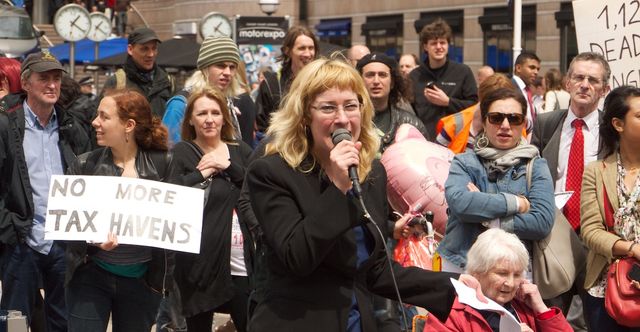
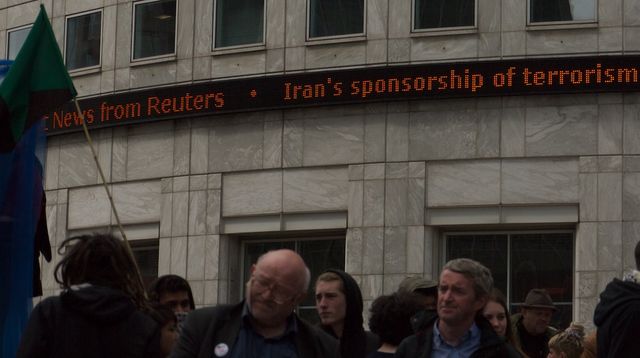
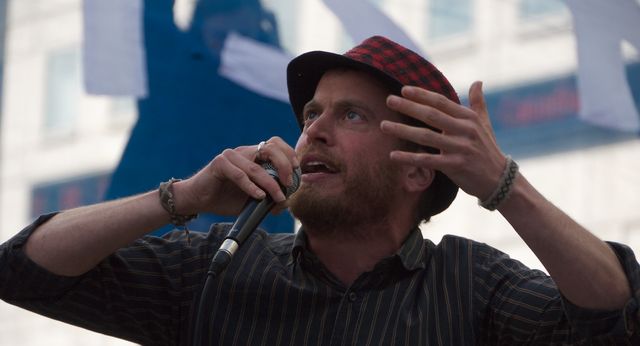
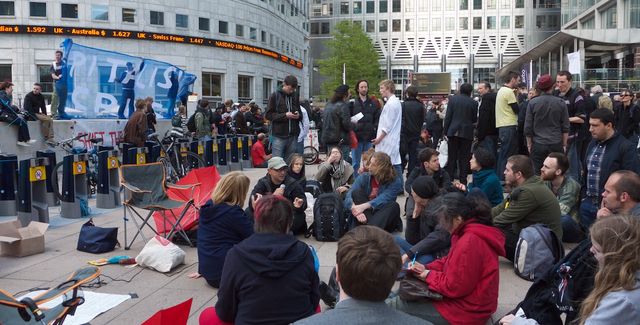
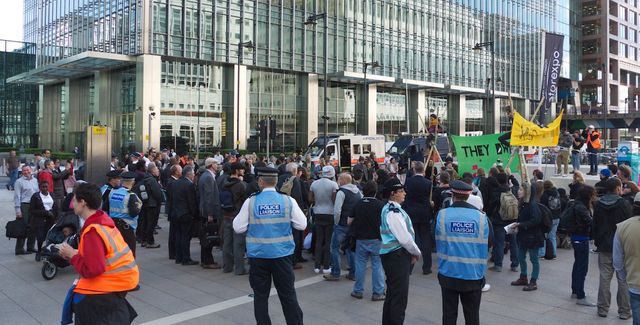
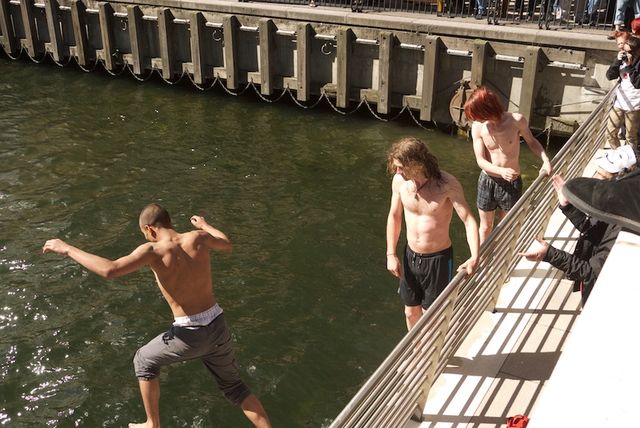
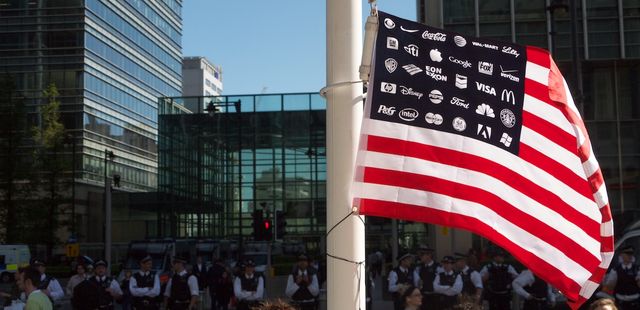
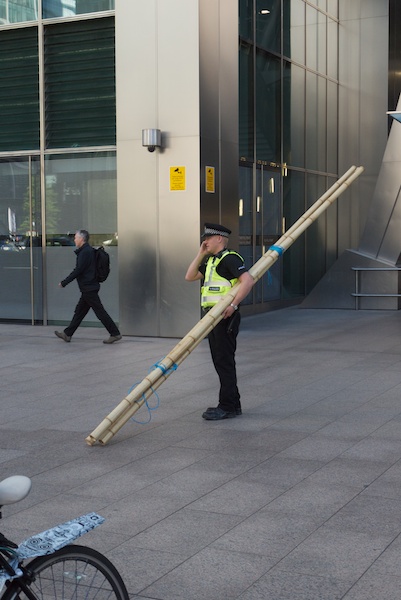
 e-mail:
e-mail:

Comments
Hide the following 4 comments
Thanks...
16.06.2013 09:11
I do wish people would people would stop calling things negative or positive though, all reflection is useful and helps us work out what to do, so let's not apologise for criticism and perspective, whether the organisers or participants in events like or agree with it or not.
Ree Mas
few thoughts
16.06.2013 10:59
** The "fluffy" J14 protest set out to involve disabled people, old people, and more liberal groups etc. It bears noting though that this didn't get MORE people on the streets than the openly confrontational "spiky" J11. The liberal pacifist line that we need to tone down our confrontation and come across as "good protesters" to reach the "masses" is patronising bullshit. There is no one "general public", there are people who want to avoid confrontation, and people who are much angrier than your average black blocker. Anyway, the reality is that both events only got a few hundred out. Neither managed to attract many people outside already politically engaged/activisty circles.
** The spiky J11 certainly got a lot more publicity and attention for anti-capitalist messages than the fluffy J14. It also cost the state and businesses probably a good few million in terms of policing, security on all the targets, businesses shutting or taking measures for the week. Fluffy J14 got nice reports from e.g. the Guardian which sympathises with this kind of "good" protest, but spiky J11 could not be ignored by masses of domestic and international media, thanks in this case to the police and their response.
** While probably there were a lot of the same people on both days, there will also have been people who were attracted to one but not the other. Anything that encourages people to come together and challenge capital, takes some action, spreads ideas, and reclaims some space is better than nothing. Both days did this to some extent at least. The J14 rhetoric about a great day of resistance is overblown, but it did achieve something. The more action the better.
** That said, one question: would it have been possible for the organisers of J11 and J14 to combine their efforts and organise one common action day? Neither group had many people organising their events. If they had combined some of their forces, perhaps they would have had the capacity for a serious publicity effort to reach beyond their activist circles? Of course, it is often just better to go our own ways and do different actions. We don't have to form some grand consensus before taking action with our comrades. But IF we do want to organise big street mobilisations again, could we form wider coalitions that bring together the resources of both "fluffies" and "spikies"? Or maybe separate blocs with different publicity, if we can't agree on that, but converging in the same area on the same day?
@
Numbers and resistance
16.06.2013 15:09
We made the headline, and the protests in London were reported by the media all over the world, alongside the much larger protests in Turkey.
It has always been my problem with the great G8 protests in the past: we gather once a year to oppose the G8 ... then what? At the time we had many thousands of people taking to the streets, not a few hundreds. I suppose numbers ebb and flow, according on how successful our actions. I think the central messages from Canary Wharf and from every other meeting was: take it back to your communities, organize resistance from there - beginning with the Greek commrades who have come share with us their very inspiring experience organizing with the communities in various boroughs of Athens.
I was very disappointed on the first day, seeing how few people turned up, and how many police... I was thinking that maybe the time of this type of protest is over, and we need to think of new strategies... then I realised the new strategies are already there, in the struggles of the disabled and other people against the cuts, against the debt, to save essential services... I thought it was amazing to see all these campaigns coming together and holding a free people's assembly in the heart of the beast, in Canary Wharf.
As people are finding it harder and harder to make ends meet, discontent grows. The riots in 2011 were a good example of what people can do when they are pissed off - and I won't drink it that the riots weren't 'sufficiently political' or people were just stealing consumers goods: to have thousands of angry people in control of the streets and the police running because they cannot do anything else looks political enough to me, though of course people may need more reflection on the real causes of their discontent... In the meantime, police control and repression have increased, as the State and ruling classes are expecting more riots. Police helicopetrs are flying over our estates any time, the police have been trained to use tasers and water cannons... hope we just don't lag behind in the preparation of the next round of trouble. We are the seed of the revolution: educate, agitate, organize!
Chiara (no borders)
assembly notes/decisions
18.06.2013 14:54
Or was it mainly just openmic style discussion without concrete outcomes?
anonymous